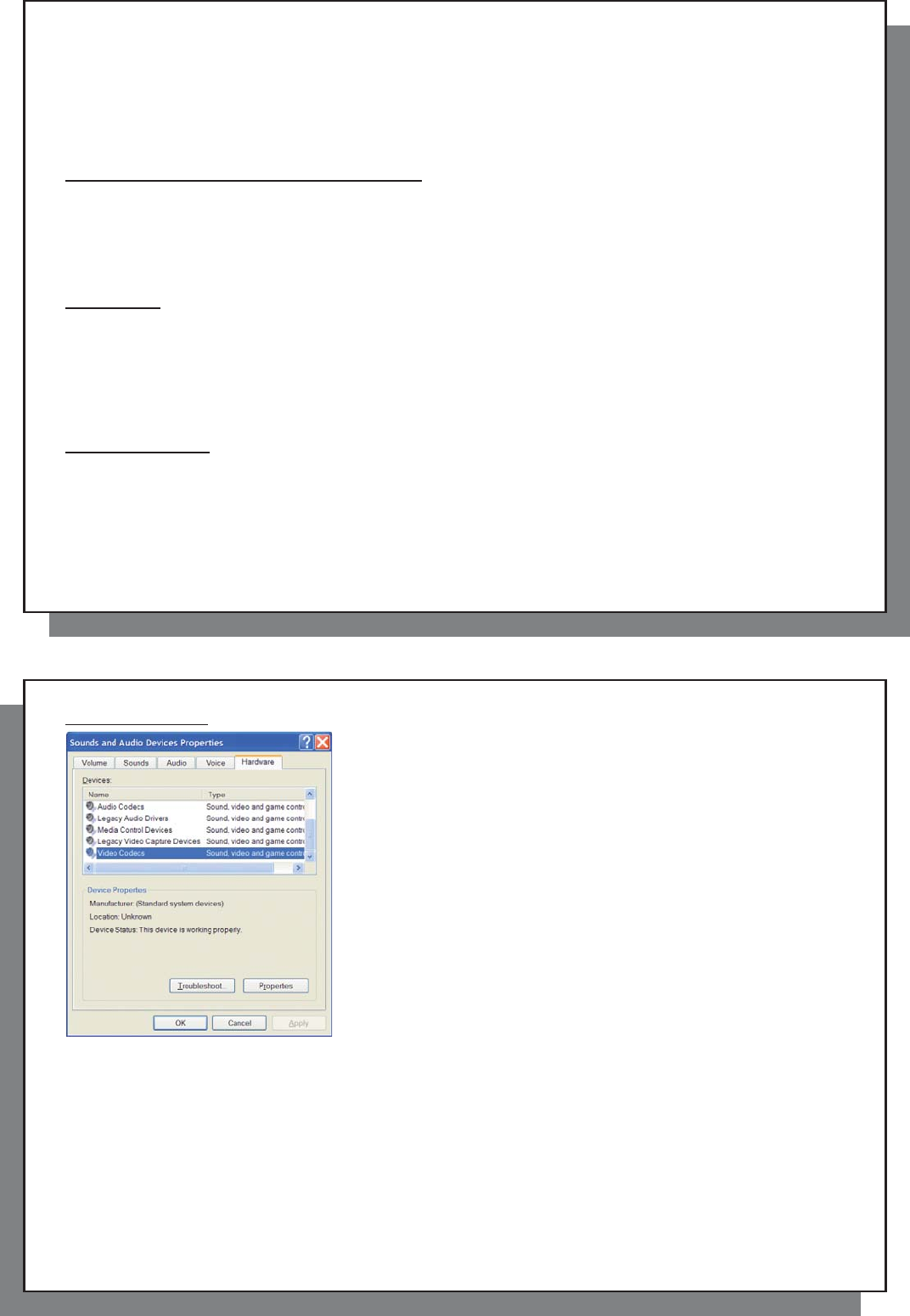
35
35
9.1 Installing the PC Software
9.1 Installing the PC Software
If your video fi le is not an MPEG-4 Simple Profi le .avi fi le of the proper size, you will need to re-encode it using
the following utilities. For the AV 500, you will need to create an AVI fi le that is MPEG-4 Simple Profi le with a
resolution up to 720 x 576 (depending on frame rate) and a sound track that is stereo MP3 or WAV. In actuality,
in all cases, a resolution beyond 640x480 does not add any advantage.
MPEG-4 codec (Compression/Decompression)
In order for MPEG4-Translator to compress the video in a fi le of the format MPEG-4 SP that the AV 500 can
read, it requires an MPEG-4 codec to be installed on your computer.If you do not have the approporiate codec
installed, MPEG-4 Translator will tell you on start up which codec it requires. You will be able to download it for
free from the Internet.
Virtual Dub
™
A utility for transcoding one video fi le into another. This is a general purpose transfer and cleanup utility which
has many options allowing for even the most diffi cult video translations. It will prompt you to save it to C:\Program
Files\VirtualDub. You should use this default directory location. Otherwise you will have to instruct the MPEG-4
Translator program where to fi nd it. For more information on Virtual Dub
™
see the website - http://www.virtualdub.
org.
MPEG-4 Translator
This program, developed by Archos, is a “Front-end” for the Virtual Dub program. It has a simple interface which
you use and it then tells Virtual Dub how to process the video fi le. It sets all the parameters for Virtual Dub
specifi cally to create a video fi le in the right size and format to be read by the AV 500. When you run it for the fi rst
time, the MPEG-4 Translator will need to locate the Virtual Dub program. If you did not install Virtual Dub in the
default location, you will have to show the program where Virtual Dub is. If you forget, Windows
®
will give you an
error when you try to launch it.
36
36
MP3 Sound Codec
If MPEG-4 Translator detects a suitable MP3 codec on your PC, it will
use it, and your video fi le sound track will be MP3. Otherwise, it will use
the standard IMA ADPCM codec. There are MP3 encoders (usually
packaged together as an encoder and decoder) available on the Web for
you to download. If you choose to use the LAME codec, make sure that
you have a version built with the ACM front-end. You can fi nd other MP3
codecs on the web by using the search terms ACM , MP3 and CODEC
in your favorite web search engine. Once this MP3 codec is installed into
your system, MPEG-4 Translator will be able to create fi nal video fi les
with MP3 sound, even if the source video fi le does not have an MP3
sound track.
If you are unsure what codecs (audio and/or video) have been installed
on your computer, you can see the list by going to the following location.
For Windows XP, click on Start > Settings > Control Panel > Sounds and
Audio Devices Properties > Hardware, choose Audio Codecs, then click
on Properties. You will fi nd a list here of all the audio codecs that are
installed on your computer. Decoding of MPEG 2 video fi les is currently
not supported by MPEG-4 Translator. These are usually .mpg or .mpeg
format fi les, not the required AVI fi le. There are other tools found on the
Internet (FlaskMPEG, Rippack, etc.) that may be downloaded in order to help you with these fi le types. A good
starting place is the website www.mpegmobile.com.
9.2 Using MPEG-4 Translator
9.2 Using MPEG-4 Translator
Here you see the image of the main MPEG-4 Translator program. When you fi rst run the program, if the required
codec has not been installed yet, you will be notifi ed. You should download the codec and install it on your
computer. If the Virtual dub program has not been installed, you will also be notifi ed, and you should install it. If
you have placed the Virtual Dub program in a folder other than the installer default folder, it will ask you to locate
the fi le.


















